
How Did I Come To Write This Play?
(for Samantha…)
I grew up on a council estate, sixties and seventies; we had a neighbour out the back of our garden; she killed her husband, invited his drinking pals into her house for a chat with his corpse. After three days she was dragged screaming from the house. I remember the policeman on a ladder and her screaming “y’can’t take him off me!” I remember her pushing the ladder away from the bedroom window and the copper toppled into the privet below.

They say drugs were involved – that could have been anything; back then on a Northern council estate even THC containing substances were seen as something uniquely wicked. I never really found out what happened but the mystery of the situation intrigued me; later I learnt that she served only a two year suspended sentence and became a local Labour politician. RELEEVO started as a way of answering something that I couldn’t research or really fathom; it then became something else completely.

The first Julie I ever wrote was in a short story, she got drunk on wine whilst waiting for Steven, decided she’d leave him but fell asleep and in the morning just went on living with him. The first part I ever wrote as dialogue was the little monologue she gives in scene two; it’s about the day away in Haworth and the ring; it was in a writing class in the City Lit, ran by Carol Burns, and I just started crying and had to leave; I felt Julie was there in me as an independent being and that her feelings were flowing through me. I could get her to talk, in fact she wouldn’t stop talking, but it seemed to me I couldn’t get her to talk about anything important or go anywhere I wanted her to go. In October 1985 I joined Steve Gooch’s playwrighting class at the City Lit Institute (I’d never been to the theatre but I had a girlfriend then who was an actress and the idea was I’d write her a good part.) Steve was an excellent tutor; he went on to run playwrighting at Goldsmiths in London. We went through all the stages of construction and structure as well as the finer points of actually writing for the stage.
It was also by talking to Steve Gooch that I felt supported in certain technical decisions; it was a uniquely dangerous decision to put a chattering mad-woman on stage with only a corpse for company. So? I knew at some point I’d need to give everyone a break: actor, actress and audience, and resurrect Steven; hence the non linear narrative; everyone needed a rest from the monotony of a woman talking to a dead man.
At the time I was fiercely conscious of class and had this un-reflected hatred of all things that were not proletarian; of course I was fascinated too by all such things, drawn to them. But for sure I didn’t want any middle class Southerners mucking this up, so I thought fuck this, “am gunna write it as yew’ve t’say it.” I did that cuz I was sick of hearing people say “I can do a Northern accent.” My standard reply at the time was, “Oh? You speak Finnish do yer?” Now I see that this matters less, not all Southerners are posh, not all well spoken people are anti-proletarian, and not all proletarians are pro proletarian. From the point of view of the accents, what’s important is to remain consistent with the accent, so choose one you can do and stick to it. Harder for any actor/tress is to shrink the range of possibility that you have; sort of deny your training and vision, and play someone whose life doesn’t have the range or scope of your own. Julie and Steven are the same or at least equal to us; intellectually, emotionally, but they talk differently and they have different training and they don’t have the escape routes we have. So you kind of have to shrink your options to inhabit them. I think that’s what I mean by “Babe down”; it’s not becoming a slob or a thug or a caricature, it’s simply demonstrating a different range of options; a narrower field of vision and opportunity.
Technically Steve was good here too; he introduced me to the work of Franz Xavier Kroetz; it’s even more restricted in language than mine, more resolutely proletarian, or at least his early plays are. And he also taught me a bit about the Epic; I came to realise that it was possible to identify with a character without believing that you would do all they did.
I honestly think that when Julie crushes the tablets into Steven’s meal she’s not consciously planning to murder him; I just think she wants to pacify him so she can announce her departure, not simply run off; I think she feels she owes him this. I also think Steven is terrified, he’s “in his own mind” murdered the child, he’s allowed someone to dupe him and thus sunk the family, and he is full of impotent rage; so no wonder he goes on a bender, no wonder the pills and the booze do more than pacify him; it’s an accident, a tragic accident, and if there is any evil motive on her part it is deeply buried. That said, any thinking person may well have considered the possibility that Steven was in no fit state to eat pills, so it’s a choice, be it limited and impossible, almost, to make. I don’t know why she didn’t think of this. I suspect that she realises almost instantly what has happened and that fuels her madness: so as long as she keeps talking, interacting with him, getting the outside world to do the same, he might wake up. Once she realises he won’t then all that’s left is for her to retain possession of the corpse. “Yer not teckin’ him from me!”
By the time I was in Steve’s class I was already having dreams where the police were coming to me and asking me questions about Julie: did I know her? What she thought? Felt? I would deny any knowledge of her and they’d insist I did know her, there had been a crime and I was a witness. As soon as I woke I’d write down as much as I could remember. It was a very intuitive and instinctive writing experience. I couldn’t say I really knew them, I just let them happen. Ibsen said, my first draft I get to know my characters, my second the characters get to know the plot, the third draft my characters get to know the play better than I do.
Sometimes I’d be embarrassed writing it, like they shouldn’t be saying the things they say in front of a stranger or that I was somehow failing them by not intervening and trying to change their lives for the better – I suppose that it was a return to childhood where I’d watch my own parents interact. Or as an adolescent, where I was beginning to internally articulate the inadequacy of that parental interaction, I still couldn’t intervene, all I could do was watch, feel, as they wondrously destroyed any love they’d had for each other… and me still not understanding the mystery of the bedroom, or the poverty of their alternatives, trapped as they were with four kids, a second world war childhood… Anyway, I’d marvel at how, no matter what and right up to their mad mad end, their love restored itself each night.
You will have to forgive me if I seem to be talking about the characters as if they are someone else, it’s not me trying to make them grander than they are it’s just – well, two things really: One) even if Julie and Steven had managed to get it together, that is to say Julie had found a cause to connect with, the child, and Steven made a go of the bikes, I still wouldn’t have wanted their life no matter how strong my affection for them. Two) that’s how they came to me, as separate and intact people.
I finished the play on Christmas day of 1985, on a wobbly Formica slide-top kitchen table in the old house I’d lived in as a child. It was just me and Dad alone in that house then, Mum had remarried and my sisters were living away. Cold, desolate, everything through frosted glass; it was as chilling as the pantry stone, something like the daily bewilderment an amputee must feel as they reach to scratch an itch on a limb no longer there; it was the most beautiful Christmas present I ever gave myself.
Southampton, June, 2013.
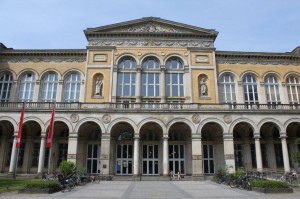
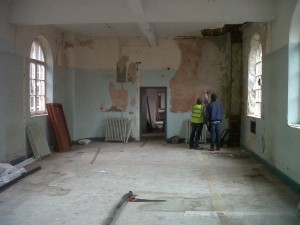
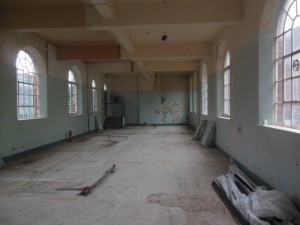
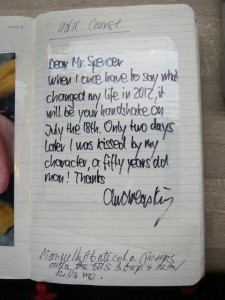
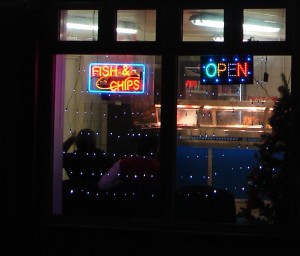
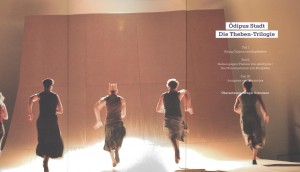
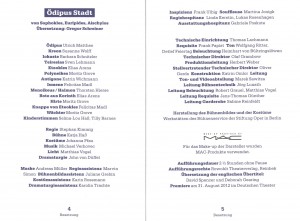
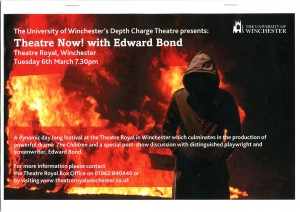
 Posts
Posts